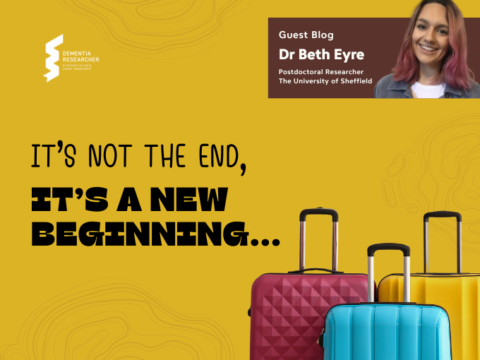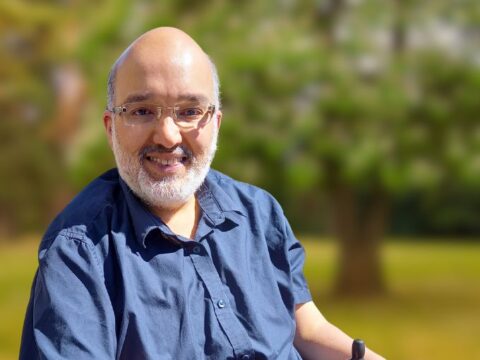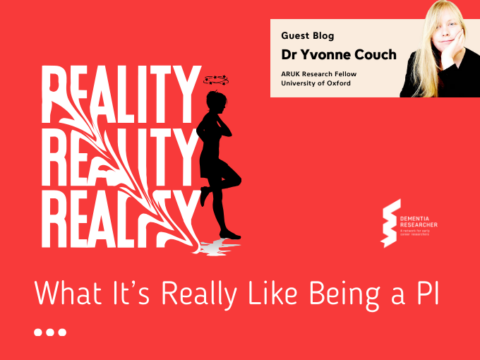Dementia is an impossibly complex syndrome. If you want to get an idea of just how complex it is, search “dementia biological pathways” in Google images. You will likely find flow charts, images and schematics showing a plethora of interactions between proteins, small molecules and cell receptors. This is why the research efforts to find new therapies for dementia seemingly move in a series of little steps forward rather than big leaps. It is a very difficult problem to unpick and it requires researchers to approach it from a variety of different angles. The strides forward are small but they are calculated and informed by a large amount of thorough research.
That research comes from more fields than just neuroscience and medicine. The two represent a majority of researchers but the list of vital professions is a long one. Engineers, mathematicians, computer programmers, care workers, nurses, biologists, materials scientists (my particular field) and a whole host of other professionals all play big roles in progressing the fight against dementia. In short, if you have an interest in aiding the efforts of eradicating dementia, the chances are you can in one way or another. In the least narcissistic way possible, let me try and cite the transition I made into dementia research as an example of how you can make such a leap.

You do not have to be a neuroscientist to get into dementia research.
I am not a neuroscientist; I am a biomaterial scientist. I studied biology to undergraduate level before switching focus to a PhD in developing new ways of regenerating hard tissues like bone and cartilage. Certainly a far cry from studying the degeneration of brain cells and tissue that we observe in dementia patients. The beauty of science is, however, the translatability of it (is that a word? I reckon so!). The techniques you are using to study a problem can be translated to something completely different. This became apparent to me when I saw a job advert when writing up my PhD thesis in 2016. The title was “3D stem cell models of Alzheimer’s disease” and it involved applying some of the biomaterials principles I had learned to the study of Alzheimer’s.
I remember sitting waiting for my interview thinking “I am not a neuroscientist, this could be a tricky one”. It soon became clear, however, that my soon-to-be employer was not looking for another neuroscientist. If he wanted one he wouldn’t be interviewing me because my CV was that of a biomaterials scientist. In short, he was interested in the different approaches I could bring to the work. He had a wealth of researchers with expertise in neuroscience and wanted something a bit different.
This is ultimately the point I am trying to make. You do not have to be a neuroscientist to get into dementia research. If you have an interest and a passion to try and help in the fight, you can likely find yourself a position that suits you. This might involve a bit of a career leap; that was certainly the case for me. I found myself moving well outside of my comfort zone. No longer surrounded by other materials scientists or specialists in bone and cartilage biology. I was surrounded by people who knew a heck of a lot more about Alzheimer’s than me. In the first few lab meetings I struggled to keep up and it was a steep learning curve. It was the best thing I have ever done for myself.
Research is about challenging yourself and trying to push yourself forward. Your comfort zone is the enemy of that kind of progress. Moving to a totally different field forced me to read up in order to catch up. I found myself scrolling through lots of papers so that I could grasp the research projects of each member of our group. The more I studied, the more I learned and the more I conducted experiments, the greater my repertoire of lab techniques became. I knew very little about dementia when I started that job. I knew the basics of the disease and I was spurred on by seeing the effects of it in my family. At the end of that research contract, however, I was incredibly comfortable sitting in a discussion with other dementia researchers.
That wasn’t because I knew as much as they did about their work. I knew my own expertise and more importantly, I was comfortable in the knowledge of how it could play an important role in the fight against dementia. Science is meant to be a rich tapestry, not a black and white picture of a single shape. You don’t have to be an expert in someone else’s work to make a career in dementia research. You just have to know where your expertise can fit in. It might take a bit of buffing up of your knowledge to secure a role but it is well worth the effort. A career in dementia research is challenging but very fulfilling. If you can think of a way to help, run with it and see how far you can get. The more the merrier!
Author

Dr Sam Moxon
Dr Sam Moxon is a biomaterials scientist, and his expertise falls on the interface between biology and engineering. His PhD focussed on regenerative medicine and he now works on trying to improve on culture techniques for human stem cells, so that we can gain a better understanding of how diseases like Alzheimer’s manifest. His work at The University of Manchester looks at 3D bioprinting with stem cells. Outside of the labhe hikes through the Lake District and is an exert on all things Disney.
Got a question for Sam? Reply in the box below

 Print This Post
Print This Post




